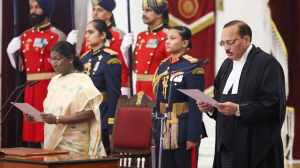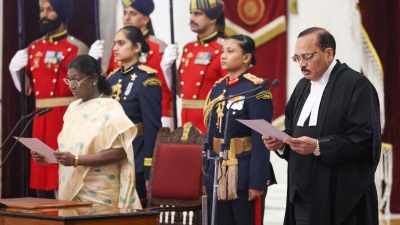Delhi HC to take up plea seeking CBI probe into ‘corruption via electoral bonds’
Chief Justice Manmohan pointed out to the petitioner that the Supreme Court had refused to interfere with the matter, citing several reasons, including the fact that the plea was ‘based on assumptions’.
 After the disclosure of electoral bond information following directions from the Supreme Court, petitioner Sudip Narayan Tamankar had filed a detailed complaint with the CBI on April 18 this year, seeking an investigation into the alleged corruption disclosed in the electoral bond data. (File)
After the disclosure of electoral bond information following directions from the Supreme Court, petitioner Sudip Narayan Tamankar had filed a detailed complaint with the CBI on April 18 this year, seeking an investigation into the alleged corruption disclosed in the electoral bond data. (File)The Delhi High Court is due to consider a plea on October 29 seeking directions for a court-monitored probe by the Central Bureau of Investigation (CBI) into instances of alleged quid pro quo and corruption by way of donations made through electoral bonds by individuals or companies to various political parties.
After the disclosure of electoral bond information following directions from the Supreme Court, petitioner Sudip Narayan Tamankar had filed a detailed complaint with the CBI on April 18 this year, seeking an investigation into the alleged corruption disclosed in the electoral bond data.
Tamankar has submitted that to date, no action has been taken on the complaint by the CBI. Following the filing of the complaint, he had approached the Supreme Court where it had disposed of the plea with the observation that recourse can be taken under appropriate remedies available under the laws governing criminal procedure or Article 226 of the Constitution which gives high courts the power to issue directions. Tamankar then moved the high court.
Taken up briefly before the division bench of Chief Justice Manmohan and Justice Tushar Rao Gedela on Monday, Chief Justice Manmohan inquired orally from the petitioner, “SC refused to interfere with the matter for a couple of reasons. One is, that it is based on assumptions. They are saying you have to go under normal process of law which means CrPC section 156(3)…So if SC is not entertaining (the plea) under Article 32, won’t the same apply to us under Article 226?”
However, the petitioner, represented by advocate Pranav Sachdeva, argued that the CBI has to respond to the complaint.
The petitioner has highlighted evidence in his petition that “indicates quid pro quo arrangements among political entities, corporations, government officials, investigative and regulatory bodies” and that companies under regulatory scrutiny from agencies such as the Enforcement Directorate and the income tax department made substantial investments in these bonds.







